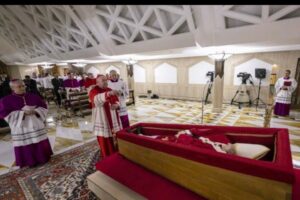

By Barth Ikiebe with Agency Reports.

Though there are 252 cardinals, only 135 cardinals have voting status and are eligible to vote for the next Pope when the conclave begins.
Europe has the highest number, with 53 cardinals of voting status.
Asia, with 23, has the next highest number of cardinal electors, followed by Africa with 18 voting members of the College of Cardinals.
South America follows with 17, while North America has 16 Cardinal electors.
Oceania and Central America, with four each, have the lowest number of electors at the forthcoming conclave.
The Cardinal electors of African origin are Fridolin Besungu (DR Congo), Ignace Dogbo (Ivory Coast), Stephen Brislin (South Africa), Arlindo Furtado (Cape Verde), Antoine Kambanda (Rwanda), Jean-Pierre Kutwa (Ivory Coast).
Others are John Njue (Kenya), Dieudonne Nzapalainga (Central African Republic), Peter Okpaleke (Nigeria), Nakellentuba Ouedraogo (Burkina Faso), Protase Rugambwa (Tanzania), Robert Sarah (Guinea), Berhaneyesus Souraphiel (Ethiopia).
The list of Africans also includes Desire Tsarahazana (Madagascar), Peter Turkson (Ghana), Jean-Paul Vesco (Algeria), Cristobal Romero (Morocco), Stephen Mulla (South-Sudan).
Interestingly, 108 of the electors were appointed by Pope Francis; 22 by his predecessor, Pope Benedict; and five by Pope John Paul II.
All cardinals under the age of 80 can take part in the secret ballot to be held in the conclave. They need a majority of at least two-thirds plus one to elect the new pope, so the voting can take several rounds spread over numerous days.
The cardinals considered to be the leading candidates to succeed Pope Francis are Peter Erdo (Hungary), Matteo Zuppi (Italy), Robert Sarah (Guinea), Luis Tagle (Filipino), Malcolm Ranjith (Sri Lanka), Pietro Parolin (Italy), Pierattista Pizzaballa (Jerusalem), Fridolin Besungu (Congo), Willem Eijk (Netherlands), Anders Arborelius (Sweden), Charles Bo (Myanmar), Jean-Marc Aveline (France).
More Cardinals have arrived at the Vatican following the death of Pope Francis on Easter Monday.
Approximately 60 cardinals gathered at the Synod hall for the first congregation of the College of Cardinals on Tuesday morning, led by the Camerlengo of the Roman Catholic Church, Cardinal Kevin Farrell.
The Cardinals had at the general congregation, on Tuesday, confirmed Saturday as the date for the funeral of the late Pope.
More Cardinals are billed to participate in the second general congregation scheduled to be held on Wednesday afternoon.
Wednesday morning will be dedicated to the ceremonial transfer of the Pope’s body to the Basilica, where he will lie in state.
Presently, general congregation is being held to discuss the Pope’s funeral but, in the coming days, it will progress to pre-conclave preparatory meetings leading up to conclave itself.
In the coming days, the Cardinals will discuss when the conclave is to start.
Then, they will at their meetings, begin to speak on a variety of matters, such as the present needs of the Church, the state of the Curia and its work, and improving the Curia and the Church’s relation to the world.
Cardinals would swear to maintain rigorous secrecy about all matters in any way related to the election of the Roman pontiff or those which, by their very nature, during the vacancy of the Pope’s seat.
The cardinals then swear collectively an oath, which reads in part: “We promise and swear to observe with the greatest fidelity and with all persons, clerical or lay, secrecy regarding everything that in any way relates to the election of the Roman Pontiff and regarding what occurs in the place of the election, directly or indirectly related to the results of the voting.
“We promise and swear not to break this secret in any way, either during or after the election of the new Pontiff, unless explicit authorization is granted by the same Pontiff; and never to lend support or favour to any interference, opposition or any other form of intervention, whereby secular authorities of whatever order and degree or any group of people or individuals might wish to intervene in the election of the Roman Pontiff.”
After this, each individual, with a hand on the Gospels, pledges his oath to the same.
The cardinal-electors are to refrain from all contact with the outside world during the election: no shared messages, no newspapers, no radio, no television.
Often, the first vote is purely ceremonial, a way for cardinals to honour particular members of the College who, though distinguished, are not considered papable (electable as pope).
From that point on, the voting is scheduled to be two sessions a day, with two rounds of voting per session (four rounds total per day).
The Cardinals select three fellow cardinals to count the votes, three others to check the counts, and three, if necessary, to collect ballots from those who, from infirmity, are unable to walk to the high altar.
Each cardinal writes on a ballot the name of his choice for pope, then walks to the high altar.
There, in the painting of the Last Judgment by Michelangelo, he says aloud, “I call as my witness Christ the Lord, who will be my judge, that my vote is given to the one who before God I think should be elected.”
The cardinal then places the ballot into the proper receptacle, bows to the altar, and returns to his place.
Once the ballots have been placed in the receptacle, they are mixed up and then counted aloud.
If the number does not equal that of the electors, the ballots are burned.
If the number is accurate, the ballots are taken out singly, noted by two cardinals, and then announced in a loud, clear voice by a third cardinal.
For a man to be validly elected Pope, he must receive two-thirds of the votes.
After the ballots are burned, and a white smoke comes out of the chimney above the Sistine Chapel, will signal a new successor has been elected.
Edited by Dada Ahmed

